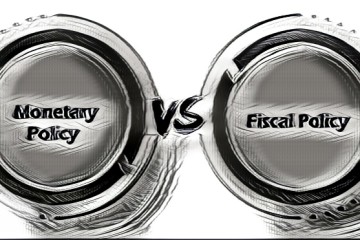Grade 11 Lesson 4: #MonetaryPolicy and #FiscalPolicy
When it comes to understanding the economy of a country, two important concepts to be aware of are #monetary #policy and #fiscal policy. In this #shortlesson, we'll cover what these policies are, how they are implemented, and their impact on the economy.
What is Monetary Policy?
Monetary policy refers to the actions taken by a country's central bank to influence the supply and cost of money and credit in the economy. In the USA, the central bank is called the Federal Reserve (the Fed), and in India, it is the Reserve Bank of India (RBI). The Fed and the RBI use a variety of tools to carry out monetary policy, such as adjusting interest rates, controlling the money supply, and regulating the banking system.
How does Monetary Policy Work?
The goal of monetary policy is to maintain stable prices, promote economic growth, and support employment. In the USA, the Fed sets a target for the federal funds rate, which is the interest rate at which banks lend to each other overnight. By adjusting the federal funds rate, the Fed can influence the cost of borrowing for consumers and businesses, which can in turn affect spending and investment in the economy. Similarly, in India, the RBI uses various tools such as the repo rate and reverse repo rate to regulate the flow of money in the economy.
What is Fiscal Policy?
Fiscal policy refers to the government's use of taxation, spending, and borrowing to influence the economy. In the USA, fiscal policy is determined by the government and is implemented by the Congress and the President. In India, the government prepares the budget, and the Parliament approves it. The budget outlines the government's planned expenditures and revenue for the coming year.
How does Fiscal Policy Work?
The goal of fiscal policy is to promote economic growth, reduce unemployment, and stabilize prices. In the USA, the government can use fiscal policy tools such as tax cuts, increased government spending, and transfer payments (such as unemployment benefits) to stimulate the economy. In India, the government can use similar tools to increase spending on infrastructure projects or provide incentives to businesses.
Impact of Monetary and Fiscal Policy
Monetary and fiscal policies have a significant impact on the economy. By influencing the cost of borrowing and the availability of credit, monetary policy can affect consumer and business spending, investment, and inflation. Similarly, by adjusting taxation, government spending, and borrowing, fiscal policy can affect economic growth, employment, and inflation.
It is important for individuals to understand these policies and how they impact their personal finances. For example, changes in interest rates can affect the cost of borrowing for mortgages, car loans, and credit cards, while changes in government spending and taxation can affect income levels and disposable income.

@ayuecosystem #kids #education #financialliteracy #finance #MonetaryPolicy #FiscalPolicy #Government #Economy #FederalReserve #Inflation #InterestRates #BudgetDeficit #Taxes #Spending #Growth #Stimulate #Consequences